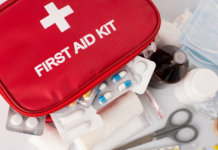Can you name the top three health ailments that affect males? What should men mostly be concerned about and watch out for when it comes to health? Many men immediately answer heart disease and cancer, and they are definitely right.
What you may not know is that respiratory diseases are a crucial medical problem that affect many men, particularly if you have been or are a smoker. At first, a respiratory issue may start with an innocent cough, but over time, respiratory issues evolve into serious and even life-threatening conditions.
In this article, we will explore three such conditions: emphysema, COPD and lung cancer, all of which greatly affect your ability to breathe properly.
 Emphysema
Emphysema
When you smoke the tiny air sacs called alveoli become damaged in the lungs. These alveoli are where the exchange of oxygen and carbon dioxide take place, so when the sacs are damaged, proper oxygen exchange cannot occur.
As such, emphysema is a chronic lung disease caused by this damage. It is a type of chronic obstructive pulmonary disease or COPD. Over time, people with emphysema have a decrease of oxygen in the blood stream. They also have a rise in carbon dioxide in the blood.
According to the American Lung Association, about five million Americans have the condition. It can create severe disability and can even shorten one’s life span by as much as six years. All types of COPD combined make up the fourth leading cause of death in the United States.
As you might imagine, the most common cause of emphysema is indeed smoking, which accounts for about 90 percent of all cases. Secondhand smoke is also a culprit, and air pollution can also be a cause, as can asthma and exposure to fumes and dust perhaps from a job.
If you begin to experience shortness of breath, a persistent cough or wheezing, see a doctor. As the condition worsens, your cough will likely begin producing phlegm and you may frequently get pneumonia. If you have emphysema, any exposure to smoke, air pollution or even to fumes from perfume can greatly complicate your symptoms and you may even need to be hospitalized. Furthermore, having emphysema puts you at increased risk of developing lung cancer, anywhere from 200 to 500 percent according to a Northwestern University Feinberg School of Medicine study.
 COPD
COPD
Although emphysema is considered a form of COPD, the term COPD also includes chronic bronchitis. Very often, the bronchitis and emphysema occur together. The constant swelling and mucus caused by the COPD partially block the airways making it difficult to breathe. COPD also makes the alveoli air sacs much more rigid and therefore less flexible. The air sacs often deflate and cave in , only adding to your breathing difficulty.
Although smoking is almost always the cause of COPD, a rare genetic disorder can also play a role; people who don’t have the protein alpha-1-antitrypsin (AAT) may be more prone to developing COPD, particularly if the person is also a smoker.
Doctors do a test called spirometry to test for COPD. The doctor will have you breathe into a large flexible tube device and the spirometer machine will measure how much air your lungs can hold. The doctor may order other lung function or blood tests to rule out cardiac issues or asthma.
 Lung Cancer
Lung Cancer
This cancer usually begins in the cells that line your lung bronchi, the tubes that help your body deliver oxygen. There are two main forms of lung cancer: non-small cell and small cell. Non-small cell cancers account for the majority of lung cancers – about 80 percent.
Each year, more men are diagnosed with lung cancer and even more are at risk for developing lung cancer than ever before. In particular, African-American men are at higher risk, as are men who have been exposed to occupational hazards like asbestos or fumes. Above all else, though, smoking remains the biggest risk factor by far. Men who have smoked for more than 30 years should talk to their doctors about obtaining a CT-scan that can screen for lung cancer.
Natural Remedies
Because it is such a serious illness, lung cancer should always be treated by health professionals. While there are some helpful herbal remedies, these should never replace other treatments, but rather be used in conjunction with your overall treatment plan and always with the approval of your doctor or medical team.
The University of Maryland Medical Center has made strides in researching herbal remedies for lung conditions. They have found several herbs that “may contain powerful medicinal ingredients” and advise that these herbs “should be treated with the same caution you would use when taking prescription drugs.”
Three herbs in particular are helpful natural remedies: American and Asian ginsengs and grape seed. UMMC’s studies on Asian ginseng suggest that the herb may lower the risk of developing lung cancer as well as other cancers like liver, stomach, ovarian and pancreatic cancers. American ginseng may suppress tumor growth.
Other studies have found grape seed extract can slow or prevent the growth of lung cancer cells, but these are early studies in cell cultures; animal and human trials are needed. Scientists think that the powerful antioxidants in grape seed extract are the acting agent.
Other cancer fighters are the herbs ginger, turmeric, asparagus and thyme.
References:
https://www.healthline.com/health/top-10-health-risks-for-men#respiratory-diseases
https://www.webmd.com/lung/copd/10-faqs-about-living-with-copd
https://umm.edu/health/medical/altmed/herb/grape-seed


 Emphysema
Emphysema COPD
COPD Lung Cancer
Lung Cancer


